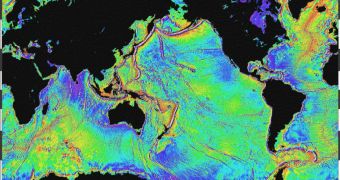It doesn't take a genius to figure out that the world's oceans are currently on the brink of becoming inhabitable for the animals they house. An important portion of all marine life in the water today could soon go extinct, due to a large variety of factors that conspire to make the Earth's oceans inhospitable. In addition to oil spills such as the one in the Gulf of Mexico, the waters are also heating up, becoming more acidic due to global warming, and polluted from human-produced runoffs. Overfishing and coral reef devastation are also taking their tolls on the water, LiveScience reports.
The Deepwater Horizon disaster began 100 days ago, and it has been unfolding ever since. Millions of barrels of crude oil have already spilled into the Gulf of Mexico, threatening wildlife, and destroying delicate ecosystems along Louisiana coastlines. These areas were of tremendous importance for a large number of fish and bird species, some of which only reproduced there. Numerous animals were also killed by the spill directly, after they were covered in a thick layer of oil. The oil, in combination with nitrogen from agricultural runoffs, can cause massive, oxygen-depleted dead zones in the Atlantis, where only certain types of microorganisms can endure.
Also promoting oxygen loss is climate change, a direct consequence of global warming. The basic chemistry of the ocean is being constantly affected by vast amounts of carbon dioxide, which is produced from burning fossil fuels in cars and power plants. As the dangerous greenhouse gas is absorbed into the waters, it produces carbonic acid, which slowly accumulates. Eventually, large amounts of the stuff will drastically change the pH of the ocean, turning the water into acid. The process, intuitively called oceanic acidification, has already begun.
The situation is so devastating that some experts say we are about to enter a sixth major extinction event. “Today the synergistic effects of human impacts are laying the groundwork for a comparably great Anthropocene mass extinction in the oceans, with unknown ecological and evolutionary consequences,” said University of California in San Diego (UCSD) Scripps Institution of Oceanography (SIO) expert Jeremy Jackson. He wrote his opinion in a 2008 issue of the esteemed journal Proceedings of the National Academy of Sciences (PNAS).
“If current trends continue, the extinctions of the coming decades will be clearly visible to future geologists comparable in scale to the great extinction events in Earth's history. I think it will be an enigmatic extinction. Future geologists will try to figure out why we apparently tried to kill off so many species, but they will find it hard to believe that simple reason is stupidity,” Carnegie Institution for Science expert Ken Caldeira says.

 14 DAY TRIAL //
14 DAY TRIAL //